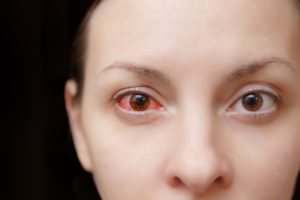Do I Need to See a Doctor for Pink Eye?
- Posted on: Sep 15 2018

What causes pink eye?
Pink eye is relatively complicated. It may develop due to an allergen or irritant, or because bacteria or a virus has gotten into the eye. Viral conjunctivitis is the most contagious of all types, which is why one student getting this infection can lead to an entire outbreak at a school.
The reason why viral conjunctivitis is so contagious is that the virus is airborne. It may stem from someone with an upper airway infection or cold coughing, sending microorganisms into the air. If a person with viral conjunctivitis sneezes or coughs, the same thing happens. This type of pink eye can also spread if an infected person touches their eye and then touches an object without washing their hands. The virus stays on the object to be picked up by the next person to touch it.
Bacterial pink eye may spread through direct contact. Conjunctivitis caused by allergies or irritants is not contagious at all.
What to Do about Pink Eye
In many cases, pink eye can be remedied at home. Treatment focuses on symptom-relief as the infection runs its course.
- Clean the eyelids and eyes using a clean cloth for each eye. Wipe each eye from the inner to the outer corner. Reusable wipes may be best.
- Apply warm or cold compresses to improve comfort. One is not better than the other; it’s all about what feels best.
- Lubricate the eyes with eye drops, taking extreme care not to touch the eye with the applicator.
- Avoid antibiotic drops unless prescribed by a doctor.
- Do not wear contact lenses until the infection has completely cleared.
- Take care to dispose of all tissues used on the eyes.
- Dispose of all makeup applicators and products that you have used on your eyes before infection. These items may be contaminated and might cause infection again.
When to See Your Doctor
Usually, we expect pink eye to resolve on its own. However, some situations call for medical intervention. These include:
- Weakened immune system.
- Blurry vision
- Light sensitivity
- Pain in one or both eyes
- Symptoms persist or get worse
- Fever, swollen glands, or persistent fatigue develops
Do you have questions about pink eye? Call our Chester, NJ office at 908-879-7297.
Posted in: Eye Conditions


